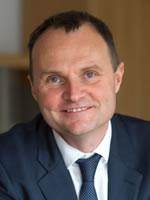How do you define a successful business? It’s a question many people who either oversee existing enterprises or are planning to start up new ones often pose.
For many years, the pursuit of profit was the key driving factor. But, with issues such as globalisation, climate change and the fourth industrial revolution bringing change and uncertainty, increasingly entrepreneurs and leaders are looking beyond the bottom line to ask if there is more to ‘company life’ than making money.
It’s something that is at the forefront of the strategy and focus of both the university as a whole and specifically the University of Sussex Business School, which was recently highlighted by the Financial Times as one of three UK establishments in the world leading the way on research into social purpose.

The quest for doing business in a socially responsible way is something that as an economic geographer I have been interested in for many years.
There has been much talk about prioritising social purpose over the years and some great examples of businesses of all sizes that do not treat the pursuit of profit and the pursuit of societal good as polarities, but things that can be done hand-in-hand.
Here at the University of Sussex, we are proud to have a number of academics exploring the real world challenges for businesses to make a positive difference to millions of people’s lives with original and innovative research.
For example, academics are exploring what steps businesses can take to ensure that their international supply chains are ethical, ensuring that participator countries receive a fair share of business gains and its resources are not exploited, and sustainable, with a focus on how supply chains can increasingly feed into the circular economy and reduce its waste and environmental footprint.
Research led by our world-renowned Science Policy Research Unit has helped bring about a significant shift in perception of the role SMEs play in innovation and growth in the UK and the EU.

Working with policymakers and the high-street banking sector, the research team have played a significant role in helping to unlock the potential of SMEs by lowering the barriers they faced in securing credit which then held back their development and beneficial impact for the wider society.
Working practices and types of employment are undergoing a generational transformation in the fourth industrial revolution and there will be forks in the road where new innovations could force business and sector leaders to choose between profitability and workers’ rights.
Exploring these issues at the university will be our new £8 million Future of Work Digit Centre which will examine how, and with what effects, digital technologies are reshaping the world of work.
With rapid advances in automation, artificial intelligence, platform technologies and huge increases in digital data presenting both threats and opportunities for different communities, the centre, headed by Professor Jacqueline O’Reilly and in collaboration with the Leeds University Business School, will focus its attention on how the potential for digital technologies to boost economic growth and productivity can still deliver good quality jobs and social integration.
These examples highlight that real change comes only through joint action from governments at a global, national or local levels, working closely with senior leaders from business and other leading organisations.
That’s why I am a member and advocate of Greater Brighton, a City Region board made up of local authorities, business leaders, academia and other key organisations.
Together we represent more than one million residents in an area covering much of the Sussex coast and north to Gatwick. We form a fully-functioning economic area with a shared ambition to ensure our communities continue to prosper and grow.
This growth is not all about the pursuit of profit. In Greater Brighton, growth of social purpose really matters and ways of practically supporting this are constantly being explored.

We already have more than 450 companies signed up to the city’s Living Wage campaign. There’s also an impressive number of social enterprises and ethical businesses, who provide buses powered by cooking oil and solar; thriving community venues; zero-waste restaurants; and vegan-friendly shoes.
The challenge we have as leaders is to make sure the right levers, encouragement and support is in place which allows our communities to make this something that matters to them.
One of our members, Brighton & Hove City Council, are currently looking at how it can become a fairer city while closing the economic and environmental poverty gap.
Another concept is district heat networks where private enterprise is working with public partners on a multi-million pound project to link up thousands of homes and business premises near the port of Shoreham to locally-sourced energy, which reduces costs and increases resilience.
To the north of the City Region, Crawley Council is drawing up a Developer’s Charter, which will include a financial contribution within the new Local Plan to support local jobs for local residents.
All are good ideas. But they are just the start of what can be done. It is only by working together as academics, government and business leaders that we can start to make sure that the economy delivers wealth for society as well as for shareholders.

—
Professor Adam Tickell is the Vice-Chancellor and President of the University of Sussex, in addition to being a board member of the Greater Brighton. The above article first appeared in The MJ in January 2020.
